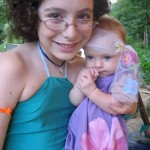The Farm School will be running a youth program in bioregionalism and permaculture education and cultural  mentoring. The Farm School will provide accredited learning for youngsters in a parallel youth congress that will join the adults during several plenary sessions that will focus on Intergenerational Dialog as we help craft a vision for the next seven generations to live in peace and justice. In addition to creating a space for the youth voice and creating excellent opportunities for learning with hands on activities, The Farm School will also be hosting a workshop series on Community Schooling and bioregional education solutions.
mentoring. The Farm School will provide accredited learning for youngsters in a parallel youth congress that will join the adults during several plenary sessions that will focus on Intergenerational Dialog as we help craft a vision for the next seven generations to live in peace and justice. In addition to creating a space for the youth voice and creating excellent opportunities for learning with hands on activities, The Farm School will also be hosting a workshop series on Community Schooling and bioregional education solutions.
Youth: (6-17 years old) Youth will integrate into The Farm School and be a part of the Youth Congress participating in outdoor education and permaculture. 
Early Childhood: (4-5 years old) Children are welcome. Childcare needs to be arranged by parents, or children can join The Farm School Early Childhood Program for a fee.
Toddlers: (2-3 years old) There will be trustworthy child care providers who can be contracted independently by parents or care can take place as a part of daily activities.
Infants: We ask that infants be cared for by their parents and trusted friends and family.
Bioregional Congress Youth and Children’s Program 2009
The week will begin with a spark of inspiration, in a circle around a fire whose flames emerged from a single coal created by the friction of a bow drill set. Each day will start this way too, in circle, taking the opportunity to give thanks.
Through the week the children will carry this inspiration into a time of focus where we will spend time learning wilderness survival skills, earth-based crafts or getting our hands dirty in the garden. Knowledge of place is a gateway to knowing ourselves and there’s no better way to become familiar with a forest, meadow or stream than to interact with it. The core routines of the naturalist will be woven into each day. These teachings allow us the ability to become a part of the forest rather than a visitor.
We will wander the beautiful ravines and ridges of the farm and swan trust lands and learn about big ideas of biology and community including interdependence, feedback, cycles and structure function relationships as we use a variety of resources including field guides, maps, compasses, hand lenses, games, theatre, song and story and peaceful conflict resolution and decision making strategies as we:
- Track deer, lizards, turtles
- Look for and gather mushrooms, nuts, leaves and roots from natures stores
- Look for and respect hazards like poison ivy, brown recluses, black widows and rattle snakes
- Look for and use a variety of forms of yield from trees in natural building that captures our imagination and passions from fairy houses, to scale villages complete with water catchment and containment systems up to full-size structures
- Complete a community service project for the farm that may include work in the schools garden or reengineering the schools front yard to facilitate absorption and diversion of water away from the school building
Each day will end in a circle just as it began. This time is spent sharing stories from the day. This is an opportunity for an elder to be invited to join our circle to share a story.
Once the children and youth carry the skills of making fire or have learned some songs this opens the door for interaction with the larger Congress. Our day can begin with the young ones teaching a song or a game. A council fire can be lit by a teen that carries this responsibility with reverence.
The week will end with a shifting focus on reintegration. A week of community, of being outdoors, of exploration, adventure, and invisible learning is a rare jewel in the lives of most children. The fire that will be alive inside of each of them will be theirs to tend upon returning home. This is a reality that needs caretaking and preparation. The intention would be that the children can carry the light of what they know is possible back to their homes, to their friends.
Bioregional Congress Youth Curriculum
Our goal is to help young attendees develop deep connections with our natural world by immersing them in our local ecosystem. Our program will run from 9:00-3:30 Monday October 5th through Friday October 9th. Our planned activities include:
- Service Project – Completing a task that will be useful for the farm and will help give youth attendees a sense of place (e.g., posting no hunting signs around the farm’s perimeter, marking trails).
- Nature Art Projects – Creating visual and/or performance art representing nature and/or art using natural materials we will collect on our travels.
- Nature Treasure Hunt – Finding and identifying local species and noting each species identified on a check-sheet.
- Nature Journal – Keeping a day-by-day journal of what we observe in nature.
- Gardening – Working in our school and community gardens.
- Natural Building with Local Materials – Constructing a meeting place from found materials.
- Food Gathering – Gathering wild edible plants and mushrooms.
- Food Miles – Figuring out how far our food traveled to get to us.
- Material Miles – Figuring out how far our other consumables traveled to get to us.
- Share-Out – Sharing our art and other artifacts of our activities with the rest of the congress.